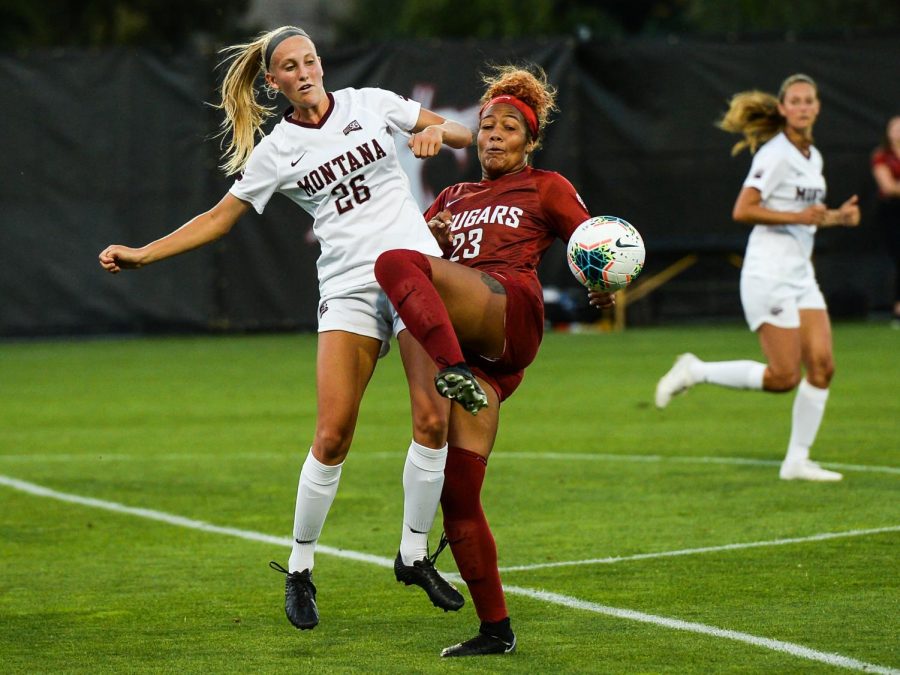WSU student-athletes use platforms for protest
Athletes’ platforms are more significant than ever, as is their impact.
SERENA HOFDAHL | DAILY EVERGREEN FILE
Sophomore defender Mykiaa Minniss defends the ball from Montana sophomore midfielder Zoe Transtrum during the game against University of Montana on Aug. 30 at the Lower Soccer Field.
October 20, 2022
“Just shut up and dribble.” The five words said to LeBron James when he criticized then-President Donald Trump for his bigoted actions and words toward minority groups.
It was a sentiment that was heavily criticized but not a new sentiment for athletes to hear. As long as athletes have used their platforms to promote change, they have been attacked for “taking away from the action” on the field and making the game “political.”
However, the use of a platform to incite change is a powerful tool and one that is necessary. In 1968, during the podium of the 200-meter race, the two Black American runners on the podium raised their closed fists in protest of the violation of human rights.
The image became iconic. Not only for Black Power but also to show that athletes can effectively use their platforms for the benefit of society.
In 2020, George Floyd died due to asphyxiation caused by a police officer kneeling on the back of his neck. Even when Floyd exclaimed, “I can’t breathe,” the police officer used his power to keep his knee on his neck, blocking his airways.
In response to this and many other recent events involving Black Americans being wrongfully killed, many athletes knelt for the National Anthem to protest racial injustice and police brutality.
WSU had several athletes who had knelt during the anthem and still do to this day. Two of those athletes are Coug soccer players who attribute their kneeling to expressing what they believe in and wanting to make a positive change.
“I was always taught to stand up for things I believe in and to stand up for people who can’t stand up for themselves,” WSU soccer player Mykiaa Minniss said.
For Minniss, being in Pullman has changed her perspective on the world as a whole and how her skin color impacts her life.
“I don’t think I realized I was actually Black on the outside until I got [to Pullman], it made me realize I didn’t have a perfect life,” Minniss said.
For fellow WSU soccer player MacKenzie Frimpong-Ellertson, protesting shows support for something she believes in. She grew up in Vancouver and went to a private Christian school; being in a predominantly white area and primarily white school impacted how she viewed protesting at the beginning.
“When I was at King’s Way [high school], I was the only Black girl at my school, I was really muted in what I believed in. Coming from that background forced me to be educated on what was real and not just fed to me my entire life,” Frimpong-Ellertson said.
It is not only soccer here at WSU that is not afraid to protest. Several men’s basketball players knelt following the insurrection at the U.S. Capitol on Jan. 6, 2021. While they faced backlash from certain fans, they were always supported by the Athletics Department at the university.
“Proud of our guys. Even if it’s just one member of that team who’s hurting, the fact that they would unify and help each other through that is the powerful message that everybody needs to hear,” said WSU Athletics Director Pat Chun.
Having support from someone like Chun is vital for student-athletes to feel comfortable expressing their beliefs and acting upon them, as it allows them to utilize their platform to promote positive change in the world.
Many professional athletes have hundreds of millions of followers and should be allowed to use their platforms on and off the field to incite change when they see fit. Their influence on society is noticeable and to tell them to “shut up and dribble” does nothing more than to further divide a nation and world that needs to be unified in the fight for equality and justice.










